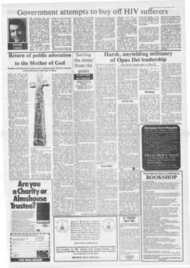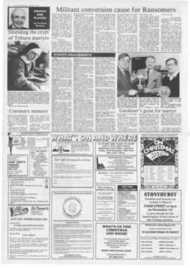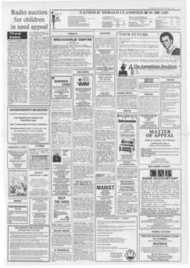Page 7, 20th November 1987
Page 7

Report an error
Noticed an error on this page?If you've noticed an error in this article please click here to report it.
Tags
Share
Related articles
No Peace At All . •
Korean Retrospect
Korean Victory: What Follows Communism?
Battlefront Converts In Korea
The Issues That Now Face Mankind
Korea revisited: when the West fought the East
The Korean War by Max Hastings (Michael Joseph, £14.95)
AS THE only conflict in which an army fought under the flag of the United Nations in pursuit of military objectives, rather than as a peace-restoring force, the Korean War has great interest. It certainly interests Max Hastings who says that the war's fascination "centres more than anything upon the battlefield confrontation between the armies of China and the United States."
Inevitably, the Americans formed by far the largest contingent of the UN army and 13 other countries contributed to that army, including Britain. Collectively, they lost 36,692 men in the three-year war to save South Korea from communist domination.
I cannot agree with Hastings that the war has been "neglected," especially on the level of military history, but certainly nobody has attempted to deal with it in the analytical and comprehensive way which Hastings has achieved.
The book is on two integrated levels. One is the war at the political level, including the international ramifications the other is at combat level, including a study of leadership. The result is highly professional — a readable, informative blend. In the early months of the war the UN troops were pushed out of the most of South Korea but in September 1950, under their supreme commander, General MacArthur, they carried out a brilliant amphibious operation at Inchon. This reversed the tide of war and led to the recapture of Seoul, the capital.
MacArthur had become a political liability because he held civilian authority in contempt and acted as if he could do no wrong. He told President Truman that he would destroy the North Korean regime and assured him that this involved no risk of Chinese or Soviet intervention. He was wrong. The Chinese intervened overwhelmingly to help North Korea and routed the better armed UN forces. Truman sacked MacArthur and replaced him with General Ridgway, who regained control of South Korea.
The fighting went on, under dreadful conditions, for two years while politicians on both sides tried to find a way of ending the war without loss of face. By the time an armistice was signed in July 1953 the casualty figures were horrendous. The South Korean army had lost 415,000 killed, the Americans 33,629, the British Commonwealth 1,263. The other UN countries had 1,800 killed. According to American estimates, more than 1.5 million Chinese and North Koreans were killed.
Another reviewer criticised Hastings for having devoted too much space to the detailed experiences of participants on the ground. I disagree. The experiences of the soldiers give a book of this type much of its interest. Through them, we learn the nature of the war and of the Chinese as soldiers. However, I do wish that he had quoted fewer Korean, American and British soldiers and more Australians, Canadians and Turks.
According to Hastings, the Korean War "occupies a unique place in history, as the first superpower essay of the nuclear age in the employment of limited force to achieve limited objectives. . . A generation later, had America been able to do for South Vietnam what she had earlier done for South Korea, the achievement would have been a cause for national selfcongratulation."
Unfortunately, the western world is largely ignorant of what the UN forces did during the war and what the US did for South Korea after the war. The South Koreans are still effusively grateful for their salvation.
Hastings concludes that it was right for the West to fight the Korean War. He will probably convince those people who read his book, though some of them — and I am one — believe that it could have been better fought.
John Latfin
blog comments powered by Disqus













